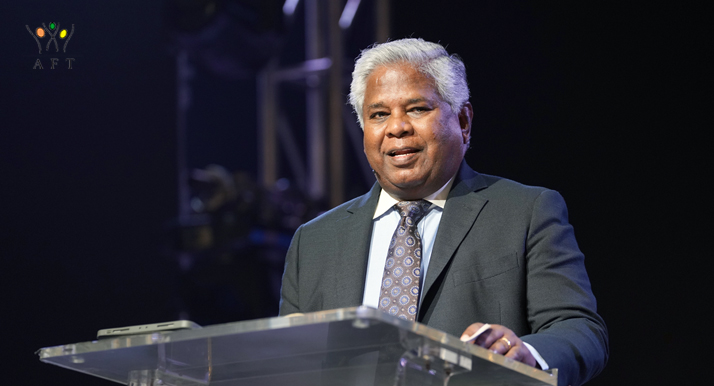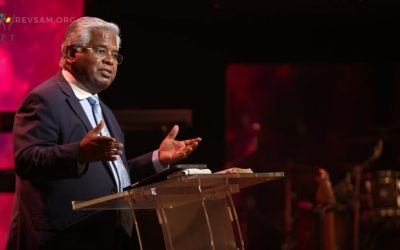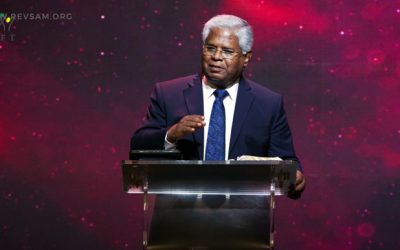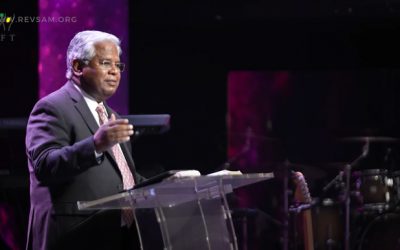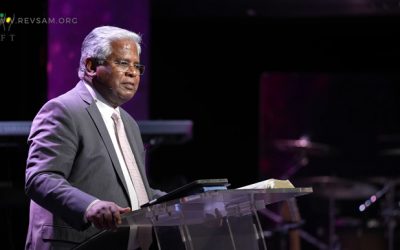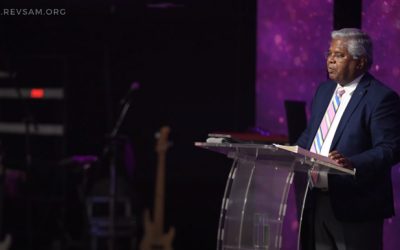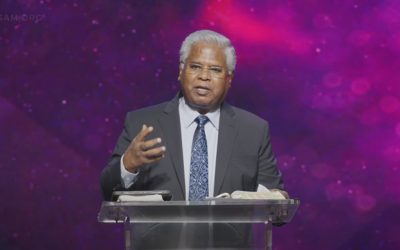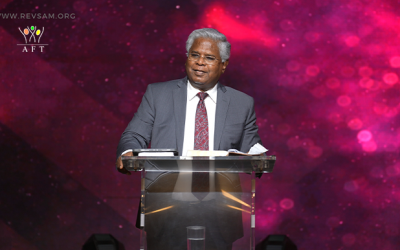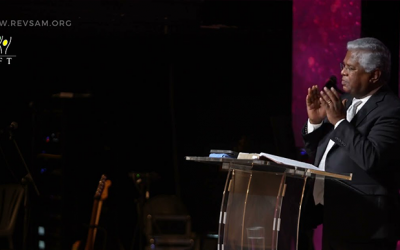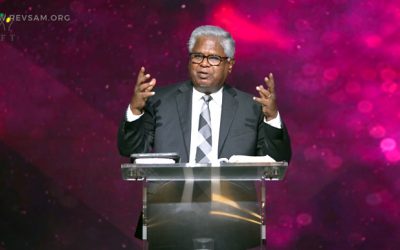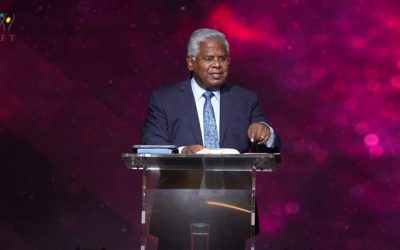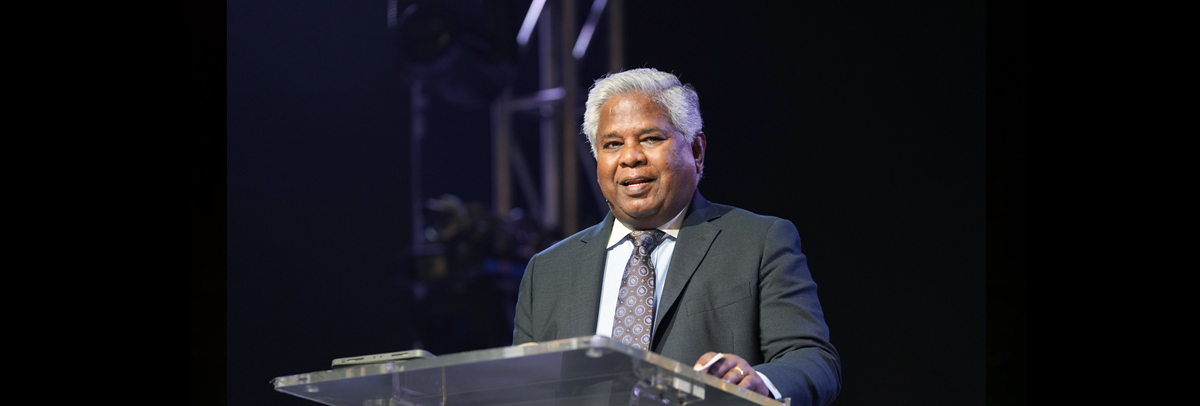
Redeemed from the Sickness: That Wonderful Tree
Sunday English Service – 27 MAR 22
Transcript
Please turn off with Exodus, chapter 15. And let me read you from verse 22 onwards. Exodus chapter 15, verse 22 onwards. So, Moses brought Israel from the Red Sea; then they went out into the Wilderness of Shur. And they went three days in the wilderness and found no water. Now when they came to Marah, they could not drink the waters of Marah, for they were bitter. Therefore, the name of it was called Marah. And the people complained against Moses, saying, “What shall we drink?” So, he cried out to the Lord, and the Lord showed him a tree. When he cast it into the waters, the waters were made sweet.
There He made a statute and an ordinance for them, and there He tested them, and said, “If you diligently heed the voice of the Lord your God and do what is right in His sight, give ear to His commandments and keep all His statutes, I will put none of the diseases on you which I have brought on the Egyptians. For I am the Lord who heals you.”
We’ve been doing a series titled, “Redeemed”. It’s about redemption, and that we’re talking about how we’ve been redeemed from sickness. Now, the Bible is full of pictures of redemption. The Bible is a story of redemption, really, from the beginning to the end. Because God planned redemption before the foundation of the world. The Lamb of God, Jesus, is the Lamb of God, slain before the foundation of the world. So, before he made the world, before He made man, God had already got a Saviour ready, Redeemer ready, and a plan of redemption also already.
So, from the first pages of Bible, you will find the story of redemption portrayed in so many pictures. There are so many beautiful pictures of redemption, particularly there are pictures about how healing for the body is also involved in the redemption, and which is what I’m covering right now. This helps us to understand the Old Testament also very well. Old Testament is full of typology, pictures, depicting salvation, depicting healing, depicting Christian life; that’s the way it goes. So, you have it in chapter 3. It all begins as soon as sin happens, the story of redemption begins. There you see the coat of skin that God comes up with, by killing an animal. He’s letting man know that without the shedding of blood, we cannot fix the sin problem. Some animal, innocent animal had to die in order to provide the skin, so that he can be clothed and his nakedness can be covered. So, there is the story of redemption beginning there. That man was clothed, with a coat of skin, drenched with the blood, really covered by the blood. He is really taken care of by the animals that died for him. It begins there, but then it goes on. And then, we went to Passover.
Last week, we looked at Passover, and this week, we want to look at this wonderful tree that God showed Moses when people came to a fount called Marah. “Marah”, means bitter. They couldn’t put the water in their mouth. Three days, they hadn’t had water to drink and here, they found water finally, and they could not put it in their mouth. It’s so salty. So, they’re complaining and when Moses cried out to God, God showed him a tree. And He threw the tree into the water and it became sweet, it says. We’re going to talk about that today.
Let me back up a little bit and work on the background a little bit, the background leading up to Marah. Now, Egypt was a wonderful land, a mighty empire, a great civilization. Very interesting that until the 19th century, very little was known about Egypt. Until then, most men in the world had failed in their efforts to read the elaborate system of Egyptian hieroglyphics which is the writing of the priests. A sort of sign language, which was written down. So, they had nothing to go on regarding Egypt except the meagre information available in the Bible in the Old Testament and the statements of Grecian historians. And Grecian historians could not be believed because they never really understood Egypt that much anyway. But in the year 1799, a French officer discovered in a place in Egypt, called Rosetta, a stone, and that’s why it’s called Rosetta Stone. It contains inscriptions in Egyptian hieroglyphics, the priestly language, which no one could decipher before. And it also had the common language that the people of Egypt used, writings in common language. And then, it had inscriptions in Greek also. And in time trying to decipher what this is all about, they found out that the Greek is a translation of the Egyptian hieroglyphics.
So, they finally come upon something. Here they can understand what the Egyptians have written, because some Greek is translated into the Greek language. So, when it became known that the Egyptian hieroglyphics has been deciphered, there was a great interest and a lot of money was poured in, and a lot of research was done. And a lot of information was gained through that. So, if you travelled to different parts of the world, and the major cities of the world, and go to the museums, you will find various collections of Egyptian articles, books, furniture, works of art, tools, from back in Moses’ days and even before. And there is much information available now about their religion, and their elaborate ritualistic worship. They had their own Bible-like book, a sacred book, which was called the ‘Book of the Dead’. They had belief in resurrection, 4000 years before Jesus ever came, they believed in the resurrection. And therefore, they took great efforts in mummifying human bodies, because they believed the souls will come and join the body is one of these days. They took great care in preserving the bodies, They had great engineering expertise and there are proves available for it from what they have found since then.
So, why am I saying all this about Egypt? Why lay such emphasis upon Egypt, and it’s wonderful civilization and history, and technology and so on? I want to simply bring out very clearly, that with all the wisdom, learning and glory and beauty of Egypt, anyone would have said, “Well, you’ve come too far. You’ve found a good country. You’ve settled down in a beautiful, very advanced country, skilled in so many ways, advanced in so many ways. You better settle down here. This is the best place to be.” But if you look at the story of the Bible, God had only one use for Egypt. And that is to get His children out of Egypt. Even though Egypt was glorious, it was a great civilization, there was so much to be said about Egypt. Every museum in the world carries articles praising the great advancement that they had back in those years. God had only one plan for Egypt, and that is to bring His people out of the land of Egypt. In Hosea, there is a wonderful verse which says, “I loved him and called My son out of Egypt.” It’s talking about the people of Israel. He says, “I loved my son, and called him out of Egypt”, He says. So, Egypt, in the Bible is depicted as the type of the world out of which people are called.
Now, the Bible is like. If you want to understand the Old Testament, and so on, you need to understand a little bit of the typology, because Bible is used to depicting and drawing pictures with words of the redemption, of the story of salvation, of the Christian life and so on. And the Old Testament is full of these things, rich with these things, of typology, shadows, and types, which depicted various things. So, if you look at it that way, Egypt is a type of the world and this is not something that preachers made up. This is something that is there as part of the Bible. The New Testament writers make it up like that. That’s why preachers today, preach it like that. Please turn with me to 2 Corinthians, chapter 6 and I’ll show you how Paul, the greatest preacher of the Christian church, looked at Egypt and how he interpreted Egypt, how he saw Egypt and its spiritual significance. Chapter 6, 2nd Corinthians, and let me read to you, verse 17. He says, Therefore, “Come up from among them.” Now he’s talking to Christian people, in the previous verse, he says, that they are the temple of God. And therefore, He dwells in them and walks among them, and I’ll be their God, and they shall be My people. He says, talking about Christian people, and how they are the temple of God, and so on. Then verse 17, says, Therefore, because you are the temple of God, because I’m dwelling in you, because I’m walking among you, because I’ll be your God and you shall be My people. That’s what the Old Testament always says, and it’s happened, he says.
Now, you’re living in the reality which Old Testament prophesied, therefore, you become the dwelling place of God. God, who said, “I’ll walk among them” is walking among them, now today. He is their God, and they’ve become His people. Therefore, he says, “Come out from among them, and be separate, says the Lord.” Now, look at the language. He could have simply said, “Well live a holy life. Don’t be like the people out there that don’t know God.” That’s what he means, really. But look at the way he puts it. He says, “Come out from among them.” He’s got in his mind, the picture of the people of Israel coming out of Egypt. The picture is this, that for 400 years, Pharoah held them in custody, would not let one person depart. There was an order to forbid anybody from leaving the country. They were put in chains, and they were slaves there. Nobody could get out of the country. If they were in slavery, they were in chains. This is what they were. And God went there and brought them out. He said so. Said, “I heard your cry. I’ve come to deliver you and take you to a land that is large and a land flowing with milk and honey.” So, coming out from among them and being separate, is a language. In Tamil it comes even more powerfully. You read it; you know exactly what he’s thinking. He’s talking about people of God, in terms of the people of Israel, coming out from Egypt. That’s what he’s got in mind. In other words, he’s saying, just like God got into Egypt, and broke the power of Pharaoh, and broke your chains and broke your bondage and brought you out of the land of Egypt. And He separated you from them, got you out, just like that. You, as Christian believers, “Come out from among them and be separate, and do not touch what is unclean, and I will receive you.”
The language is very significant. If you know Tamil, if you read it in Tamil, it’s even more powerful. Sometimes Tamil is very powerful. Sometimes English is. I’m preaching in both languages, so I get a good dose of both. But the thing is the language betrays the fact that he’s thinking of the people of Israel coming out of Egypt. And in his mind, he considers the Christian life in this way. Just like the people of Israel were brought out of the bondage of Pharaoh and the slavery. The people of God today, the believer, should be brought out of the bondage of sin and slavery to sin and everything that binds them. They should be brought out; they should come out of it. And the people coming out of Egypt back in those days, is simply a typological picture of today’s Christian coming out.
Now, I’m not making that up. This this is the way Paul regularly interprets. Turn with me to 1 Corinthians, chapter 10. 1 Corinthians, chapter 10 gives a very clear example, in verse 1. It says, Moreover, brethren, I do not want you to be unaware that all our fathers were under the cloud, all passed through the sea, all were baptized into Moses in the cloud and in the sea. It’s talking about the people of Israel coming out from Egypt and coming through the Red Sea and coming through the wilderness, eating the manna, and drinking water out of the rock, and all that. All ate the same spiritual food, and all drank the same spiritual drink. For they drank of that spiritual Rock that followed them, and that Rock was Christ. But with most of them God was not well pleased, for their bodies were scattered in the wilderness. See, they died in the wilderness because of their disobedience, he’s talking about that. Now these things became our examples. He’s saying that what happened to the people of Israel when they came out of Egypt, and the way they behaved in the wilderness, and the way they perished, one whole generation perished in the wilderness is the example of the today’s Christian, he says. To the intent that we should not lust after evil things as they also lusted. And do not become idolaters as were some of them. As it is written, “The people sat down to eat and drink, and rose up to play.” Nor let us commit sexual immorality, as some of them did, and in one day twenty-three thousand fell. He’s talking all about everything that happened in the wilderness. Let us not tempt Christ, as some of them also tempted. In other words, they tempted Christ, he says. The way they tempted God and tested God in the wilderness. He is talking about that and says that they tempted Christ, and were destroyed by serpents, nor complain, as some of them also complained, and were destroyed by the destroyer. Now, listen to verse 11. Now all these things happened to them as examples, and they were written for our admonition – how much clearer you can be? In other words, you read it, and you better learn from it. He says, for our admonition, upon whom the ends of the ages have come upon us who live in the end times. “It is written for us”, he says. Okay.
So, this is very significant. That is why we’re looking at it. That is why I’m looking at Egypt and what happened there, and their journey out of there, because it has great things to teach us. Now, remember, last week, we talked about the Passover, how they observed the Passover on that day they came out of the Lamb. And every time the plague came, 10 different plagues came, God made sure that a line was drawn between the Egyptians and between and the Israelites. The line was between the difference between life and death. He draws the line on one side of which is life and on the other side of which is death. On the one side of which is life, abundant for spirit, soul and body. There is even protection for the body, strength for the body. We talked about how they not only smeared the blood on the doorposts, and sat there inside that house, the blood-smeared house, but they ate the flesh of the lamb that they killed, the Passover lamb. And they received the strength from the lamb that they ate, and they were ready for the journey by the strength that they received. So, there was life. Not only were they preserved from dying, not only did the angel of death pass over them seeing the blood, even for their body, there was benefit. Spirit, soul and body, there was abundant life on this side of the line. On the other side of the line with Egyptians, and for them, there was death. Tremendous picture.
What is the difference between the Egyptians and Israelites? You can’t believe that Israelites were far better people than Egyptians. Some ways, Egyptians would have been better probably. Israelites were not all that good people. Look at the way they behaved in the wilderness, how they tested God, how they disobeyed God, how they murmured and complained and how they behaved. Very irritating people. So, there was no merit in them. You know, God didn’t draw lines, because these people are better people. And I like them. So, I’ll draw a line and they’ll stay here and I’ll give life to them and death to them. No, it’s not based on that. What is it based on? What made the difference? What did the Israelites have that the Egyptians did not have? Why would the Egyptians put on the other side where there was death? And why were the Israelites on this side, the good side, where there was life and life abundance? Only one difference. The Israelites were given a lamb to kill and shed its blood and smear on the doorposts and stayed inside the house. They killed the lamb, shed its blood, smeared it on the doorposts, stayed inside the house. It’s all a picture of the Lamb of God. They had a Lamb of God. Every house had death, the Egyptians as well as Israelites, In the Egyptians house, the firstborn died. But in the Israelites house, instead of the firstborn, a lamb was killed. There was death here also, but a substitute died. That’s the picture there.
So, just imagine what happened that night. All that the Egyptian physicians could do and they could do a great deal, was in vain. They were good in technology, and scientific knowledge and so on. The history of medicine shows us that they had the most elaborate system of medicine and surgery back then. The ancient graveyard dating back to 1500 BC, they say, skeletons were exhumed, on which all sorts of delicate and difficult surgical work was done. Digging up these bodies, they found that the bodies had signs of delicate surgeries that were done to that body. What kind of surgeries? They say surgeries that amounted to removal of tumours, surgeries that had to do with the eyes, and so on. Back then, they even have the knowledge of how to put a hole through the skull to remove a tissue or something like that, from inside. Back in 2800 BC, there is evidence to that, they say, in medical history. And because they preserved the bodies and mummified their bodies, and they were so keen to do that, they didn’t want the body to be marred in any way. They wanted to preserve the originality of the body. So, in order to embalm the body, they had to remove certain parts of the body. The brain had to be removed, and so on. And they would remove the brain through the nostrils, it seems. That’s how much they were advanced. Because otherwise, you’ll have to cut through and then the face will start looking different. So, they had all these. There is evidence that they were quite advanced in medical technology and medical knowledge. Extensive catalogue of medicines was available there back then it seems. Extensive publication containing a list of medicinal drugs, their effects and the directions for how to use and so on.
So, I’m just telling you this because you can imagine on that day when the plague came and people died in every home, the firstborn died, what would have happened? Imagine the king’s house, the pharaoh’s household. You think the pharaoh would have just sat and watched as everything happened? No, he would have summoned the best physicians in the country, the best people in the country to come in, so that his descendant will be preserved to rule after him, so that death will not happen in his house. But lo and behold, by the time they came, his descendant was dead. They could not do anything about this plague. All the best doctors of the world that they had, could not help to preserve their life. Nothing helped. There was only one remedy that was available and that was the blood of the Lamb of God. That tells us something. The blood of the Lamb of God was shed, it was applied, it was displayed on the lintels and the doorposts. and it was continually there as they sat inside that house. And just imagine, as they walked down to that place, what a wonderful sight it must have been to see a mighty nation of people, including thousands of aged men and women, in all kinds of conditions, in a society of 3 million people are our 30 lakhs people. That’s quite a significant number. If you had 100 people, there’ll be several people sick. You know, can’t move, can’t walk, can’t do this, can’t do that; he’ll have so many complaints. But all of them walked out. Men, women, children, young mothers, people that had been feeble, people that were probably bedridden all this time. Something happened to them as they sat there, protected by the blood. Blood redeemed the people, sitting there and eating the flesh of the Lamb. God told them to eat it, so that they will have the strength to pursue their journey through the wilderness. They got up. There was not one feeble among them. I told you last week, as they left, it is described in Psalm 105, what their condition was that there was not one feeble among their tribes. Out of the 3 million people, there was not one, one feeble among them. Something supernatural happened, and they left. And these things are an example, the Bible says to us.
And now, we are in chapter 15 and that’s where I read these verses from. Chapter 15 is where they come out through the Red Sea, cross the Red Sea, come out on the other side. The enemy is drowned, trying to follow them. Pharaoh’s army is drowned. All the horses and chariots, soldiers drowned. But these people were out. Now, listen to verse 1. Listen to a very interesting chapter, it says, Then Moses and the children of Israel sang this song to the Lord, and spoke, saying: “I will sing to the Lord, for He has triumphed gloriously! The horse and its rider, He has thrown into the sea! The Lord is my strength and song, and He has become my salvation; He is my God, and I will praise Him.”
We used to sing that song. We used to sing it in the Bible College that I went to 40 years ago:
I will sing to the Lord,
For He has triumphed gloriously!
The horse and its rider
He has thrown into the sea!
The Lord my God, my strength, my song,
Has now become my victory.
The words were taken right out of this chapter here. It’s a long song really. Instantly they wrote a song, they were filled with joy, because just imagine. They had seen 10 plagues; God had drawn a line. Every plague affected the Egyptians, but not the Israelites. God had treated them so special they saw before their eyes, how God could do tremendous miracles, and preserve them, save them, and deliver them from a country in which the man held them in bondage, in chains, and would not let them go out. And nobody could help them. No power on earth could help them and bring them out. But God came down and brought them out successfully and the Red Sea was before them. They thought they were finished, and Red Sea opened. The waters to like walls on both sides as they crossed the sea. When they got through, and when the enemy tried to push you, the enemy was drowned. Just imagine the feeling that it’ll give. If you were there, if that’s what happened, what you will feel like. I can imagine them singing.
So, they’re singing, look at the words of the song in verse 2: The Lord is my strength and song, and He has become my salvation; He is my God, and I will praise Him; my father’s God, and I will exalt Him. The Lord is a man of war; the Lord is His name. Pharaoh’s chariots and his army He has cast into the sea; his chosen captains also are drowned in the Red Sea. The depths have covered them; they sank to the bottom like a stone.
“Your right hand, O Lord, has become glorious in power; Your right hand, O Lord, has dashed the enemy in pieces. And in the greatness of Your excellence, You have overthrown those who rose against You; You sent forth Your wrath; it consumed them like stubble. And with the blast of Your nostrils, the waters were gathered together; the floods stood upright like a heap; the depths congealed in the heart of the sea. The enemy said, ‘I will pursue, I will overtake, I will divide the spoil; my desire shall be satisfied on them. I will draw my sword; My hand shall destroy them.’ You blew with Your wind, the sea covered them; they sank like lead in the mighty waters.
Amazing words. And song still goes on. It’s a long song. I don’t have the time to read it. But let me read verse 19, the end of this psalm. Verse 18: “The Lord shall reign forever and ever.” For the horses of Pharaoh went with his chariots and his horsemen into the sea, and the Lord brought back the waters of the sea upon them. But the children of Israel went on dry land in the midst of the sea. Then Miriam the prophetess, the sister of Aaron, took the timbrel in her hand; and all the women went out after her with timbrels and with dances. So, they’re playing the timbrels, dances. Look at the way they’re worshiping. They’re rejoicing before God. They’re celebrating the victory. I would celebrate it like that, too, if I was there. It is something to shout about. It’s something to jump up and down about. It’s something to dance about. I tell you. I bet you, if you meditated enough on your redemption today, on what Jesus has done, how He has brought you out of sin and bondage to sin, and Satan, and how He has delivered you, set you free and blessed you. If you meditated on it, you cannot help but dance! Believe me, I’ve danced, shutting my doors in the room because if I came and danced, there’ll be people criticizing me. They can’t criticize me for dancing in my room, in my house. But people in my house know that I’ve damaged in the house. I just enjoy the Lord’s redemption, enjoy the Lord’s goodness, enjoy the Lord’s blessing. When I think about it, sometimes, I just want to play music and sing and dance, because it is something to shout about.
And Miriam answered them: “Sing to the Lord, for He has triumphed gloriously! The horse and its rider, He has thrown into the sea!” That must have been the chorus for the whole song. Then we come to verse 22 and that’s where I started reading. Then verse 22, says they went out into the wilderness, and they went three days in the wilderness without water. Now, three days going without water made them forget the song, forget the 10 plagues, forget the miracles of God, forget how God drew a line between them and the Egyptians, forget all the miracles that God did, forget God’s tremendous favour, this tremendous deliverance from a horrible fellow who would not let them go for 400 years. Generations after generation have served him. They would not let them leave the country. Just imagine if you were not allowed to cross the border here. God did such great things for them. They forgot all about that.
Verse 23 says, Now when they came to Marah, they could not drink the waters of Marah, for they were bitter. Therefore, the name of it was called Marah. Let’s talk about it a little bit. Israelites murmured because the water at Marah was bitter. Now, they’re going to learn some lessons about God because they haven’t had much time with God and much learning about God. What kind of God is our God? Every time you face a problem, you face a crisis and a difficulty, you ought not to complain and murmur because God looks at it like this. God looks at it as a wonderful opportunity to reveal something about Himself for you. Which is what God did. God revealed Himself as the great Redeemer. And in the Old Testament, there are seven redemptive names which God reveals Himself through. Are you familiar with those names, the compound names? It starts with the first name, ‘Jehovah’ and then ends with another name like ‘Jireh’ or ‘Rapha’ or ‘Nissi’ and so on. So, you have ‘Jehovah Jireh’ in Genesis 22:8 where Abraham takes his son to sacrifice him because God told him. And he reaches up the mountain and there he learns that God didn’t want his son to be sacrificed. God got him there to teach him how he’s going to sacrifice His Son. So, God tells him “Hey, don’t kill your son; I’m going to kill My Son as a sacrifice for the whole world. I brought you here to teach you that, to tell you the Gospel.” And so, Abraham looked around, there he saw a ram caught in the thicket and he took that ram and killed it. And he named that place ‘Jehovah Jireh’. Do you know why? Because he thought, well, that ram left its home even before I left. It came here, it’s waiting for me. God didn’t have me wait there for the ram to come. It got here before me and it’s waiting for me.
Look up the way God provides, particularly, look at the way God provides redemption. Before God created the world before He made the man, God already provided the Redeemer. That’s why He’s called, the Lamb slain before the foundation of the world. God had the Lamb waiting. The Lamb of God has been waiting at the throne of God from eternity past for man to sin and fall, so that He could come as a man in this world and redeem us! That’s why He named that place ‘Jehovah Jireh’. People have translated it in very simple ways, as ‘the Lord will provide’. But it really means, not just the Lord will provide. It means that the Lord gets ready to provide our needs, long before our needs arise. What a great comfort it is. And all those redemptive names reveal how God meets every aspect of our needs, the spirit, soul and body. Every area of our need is met. That’s the specialty about redemptive names. Every name reveals how God meets all our needs through redemption. So, here is ‘Jehovah Jireh’, providing redemption through the Lamb of God, Who will come to bear our sin and carry upon Himself our weaknesses and our sicknesses, on the cold tree, on that Cross.
And then, we have ‘Jehovah Rapha’ which is what we’re going to talk about today, in Exodus 15:26. ‘Jehovah Rapha’ given in this incidence. See, they didn’t know that God is going to give a tremendous revelation to them about how He’s the healer. The water is bitter, but God has got a solution. He’s going to teach them something about it and He is going to show them and say, “Hey, I am making a covenant with you that I am your healer. I will show you today.” That’s what God is teaching them here. He’s going to reveal to them His redemption which includes healing. ‘Jehovah Nissi’ is the Lord our Banner. The Lord Who fights our battles for us, fights battles for us when Satan attacks us, whether in soul or body. And then, ‘Jehovah Shalom’ in Judges 6:24 is the Lord our Peace. Now, there’s another verse in the Old Testament that says, Thou will keep him in perfect peace, whose mind is stayed on thee. Perfect peace. What is peace? Imagine it is to arrive in Israel, said they have a brochure explaining the word ‘peace’ because everybody there greets one another with “Shalom”. And so, they were explaining in the brochure what ‘Shalom’ meant. Shalom is nothing missing, nothing broken. That’s what it means, it seems, in Israel. Nothing missing, nothing broken. What a wonderful thought. Every time they said “Shalom”, they said, “Nothing missing, nothing broken.” And when they blessed you, saying, “Shalom”, that means may nothing broken in your life, may nothing be missing in your life, that is good.
So, the Lord, Who became our peace, our perfect peace guarantees that nothing is missing, nothing is broken. Everything is alright in spirit, soul, and body. And ‘Jehovah Rohi’ which is the Shepherd, in Psalm 23:1, The Lord is my Shepherd. The Shepherd not only feeds the flock, but He also carries an oil with Him, it seems, to treat the wounds of the flock. ‘Jehovah Tsidkenu’, the Lord our Righteousness. Righteousness means rightness for spirit, soul, and body. All three of which God teaches us to pray that may be preserved blameless, until the coming of our Lord, Jesus Christ. In 1 Thessalonians 5:23. And then finally, ‘Jehovah Shammah’ in Ezekiel 48:35, which means the Lord is present. The Lord who was present there, turned the waters of Marah sweet through the tree, is with us today. That same Jesus. He’s the same yesterday, today and forever. He is with us. See, the people didn’t know that this was a wonderful occasion in which God is going to give them one of the greatest revelations that they will ever have. And that revelation is going to be about their healing. God’s provision for their healing.
The bitter waters of Marah had a message for them. It reminds us that life. See, that water is a picture or typology of life because the human body contains 75% water, they say. Mostly water. So, water depicts life that is living in his body. And the waters of Marah, see Marah is where they found a fount, spring of water. And they were glad they found it because in three days they hadn’t had water. Here is a spring and they come near it and they could not even put it in their mouth because it’s so bitter. They were disappointed. The message that God is giving them, the reason why God brought them there and the message that Marah, that fount, gives them is that life which water represented, those waters represented life and that life is embittered at it’s very fountain head. In other words, at the source itself, it’s bitter. God is saying, life, at its source itself, is bitter since the fall has happened, since men are fallen today. Since sin has entered into the world, at the very source, it’s bitter. That’s why, when a child is born in the hospital, immediately, the mother is anxious and the family’s anxious. They want to see that everything is alright – there is two hands, two legs, eyes are working fine, ears are working fine, is the child looking okay, all body parts seem to be fine, breathing okay. Does the child seem okay? They’re all concerned about whether there is any problem in the child. Now, even if the child looks okay, the truth is that every child carries with him, every child since the fall of Adam, born in this world carries within it, the seeds of some kind of trouble that is going to happen later on. Some disease or some imperfection. The seeds of that are there within the child, which may not show up immediately but will show up later. Because sin has become part of human life. Like David said, “I’m conceived in sin. In sin did my mother conceive me. I was born in iniquity”, he says is. So, at birth itself, at the fountain head of life, as the child is born itself, something is wrong. It may look right but something is wrong. Just like the waters of Marah at its fountain head was bitter. Life, at its beginning itself begins with this problem of sin because man is born in sin. There’s going to be trouble later on. Something that is going to happen to the child is there in the seed form already in there.
So, God is giving the message. Life has changed. The waters that are supposed to be nice to drink, is now bitter. At the fountainhead itself, it’s bitter. This shows that life, from the very inception itself is in many ways poisoned. In many ways, something has gone wrong it. As soon as he introduces that Marah, the bitterness of the water, then when people murmur, saying, “What shall we do now? What should we drink? Why did God bring us here? What shall we do?” God chose Moses under that tree. Not every detail is given. God shows Moses the tree, it says and then, Moses took the tree and put it in the water and the water became sweet. God must have said something. God showed him the tree. As soon as he introduces the bitterness of Marah, God points to the tree. In other words, He’s saying, “Look, life is going to be bitter. If you’re just born in this world and just live in that way. As a natural man, born in this world, life is going to be bitter because from the beginning you’re carrying the seeds of sin and the seeds of sin are going to produce its fruit in you in various forms. The curse is going to show up in everywhere.” What is the solution? Has God done something about it? I tell you, before you were even born, God has prepared a Redeemer to fix this problem. That’s why I say, God is good. God didn’t fix it just 2000 years ago. Before the world was made, before man was made, before man ever sinned, God prepared the Redeemer. And that Redeemer will redeem by dying on a tree. So, God shows the waters of Marah, that bitterness and shows that life at its fountain head itself is bitter. And shows, points to the answer that is Jesus, the Cross and what happens there.
What a picture. God is good at preaching. Amazing picture, He shows. He’s saying, “Look, this is bitter; you can’t put it in your mouth, but if you take that tree and put it in this water, it’ll become sweet.”
Someone found a substance known in chemistry that is about 700 times sweeter than sugar. Almost accidentally, this person found it. He was a chemist working in the chemistry lab. While he was working at it, I think somebody called him to eat and so he went to eat and he had a sip of the tea and lo and behold, his tea tasted too sweet, too sweet to bear it. Hundreds of times sweeter than what normal sweetener will be. So, he was shocked. Wondered what has happened. So, he thought before he complained about it, he thought he will just take care of this thing that he’s feeling in his tongue. He felt awful in his tongue. So, he took some bread and thought he might bite on some bread and took a bite of the bread and the bread tasted like the sweetest cake. Then, he knew that something was really wrong. He wondered if he was all sweet everywhere. He put his finger in his mouth and sucked on it. It was like a chocolate. So sweet. Sweeter than any sweet chocolate. So, he rushed into his lab and started checking every test tube, everything that he was working on and trying to figure out what has happened to him. He found out that he has mixed two things and was boiling it, and the vapor of that thing had gone into his mouth, touched his lips, his throat and gone into his lungs, so that everything is now sweet. That man was Constantin Fahlberg, who discovered saccharin, accidentally like this. Saccharin is 700 times sweeter than sugar, they say. That’s how saccharin was discovered.
Now, why I said this is, if you understand what this tree is all about by the light, which the Holy Spirit will provide. The light provided in the Word of God and with the Holy Spirit’s enlightening us. If you understand what this tree is all about, then something is going to happen to you. Everything, every aspect of your life, is going to become sweet in some way. So wonderful beyond all expectations. When you begin to see what the Cross is about, that tree represented the Cross. It was a typology of the Cross; it spoke about the Cross. When God pointed to the tree, He was literally pointing to the Cross. If you asked Paul, that’s what he would say. That’s the Cross. People drank out of a rock in the wilderness and Paul says that rock was Christ. What do you say about that? He says they drank out of that rock and that rock was Christ. That’s the way he interprets. He says this is the picture of the Cross and Jesus on the Cross and what Jesus on the Cross, through His suffering and through His death can do for you. That is the thing that will fix the bitterness of life. The unbearable bitterness of life will be fixed only through the Cross and what Jesus does for you on the Cross of Calvary. When you begin to understand that and see the picture of that, what Jesus has done, how He suffered and died, then, if you believe it and embrace it, when you accept it, when your heart is filled with that truth, when you embrace that truth and believe and accept that truth, I’ll tell you, life will become sweeter than ever before.
Until then, sin will play in so many ways. The seeds of sin are there. It’s going to produce its fruit. It creates all kinds of problems. Family life is a problem. Human life on all levels is a problem. Because self is ruling. Selfishness is ruling because sin is ruling. It will show up in so many ways. You’re only thinking about yourself. That’s the sin’s primary sign – selfishness – me, me, me. What I want; not what somebody else wants. Me first; I’ll eat first. I’ll buy my clothes first. I’ll do everything for me first. Let’s see if I have anything left over, we’ll take care of you. That kind of a thing. That’s the thing that causes all kinds of problems in human life. And when two selfish people get together, you’re going to have an explosion of trouble. Each of them is going to live for themselves, not caring about each other. And when the whole family gets together, and they’ve all got this sin and everybody’s thinking only about themselves, every child is thinking about himself, you’ve got to pray because you’re living in hell then. It’s not even liveable, it’s not bearable, it’s bitter. You can’t even put it in the mouth. Life becomes so bitter. You can’t take it. What is the answer? The answer is what Jesus as done on the Cross of Calvary.
When Jesus comes into your life, you embrace this truth. You understand what the tree is all about, what the Cross is all about. Your life will be transformed and that’s how it becomes sweet. That’s the message that God is showing. He’s taking them to Marah, showing them the bitterness, showing them that the fountain head life is better. And the only thing that fixes it is the tree. He’s pointing to the tree and the tree bears fruit. What kind of fruit does the tree bear? It brings forgiveness of sin, it brings peace, it brings healing, it brings health, it brings victory over the devil, it brings victory over death, victory over hell. It brings deliverance and peace on all sides. That’s the fruit it produces. And this tree, the Cross was placed at a place called Calvary. That is where it was placed and that is where Jesus, the Son of God was crucified. In Latin it’s called ‘calvarium’ meaning the place of the skull. Skull is the bone structure of the human head, right? After all the flesh is taken out, just the bone is left. In Tamil, we say, “Maṇṭai ōṭu”. Just to bring to your attention. In English, it sounds so nice; skull, yeah. No, maṇṭai ōṭu, then you will understand. The place is called the skull. In Tamil it’s call [Tamil]. [Tamil] is maṇṭai ōṭu, you see? It’s that thing, the skull. English language is too nice, you know. Tamil hits the thing. [Tamil] immediately you feel, Oh, my God. Why, the skull? Why is a place called the skull should the cross be placed? Because what more fully shows the depth of man’s fall than the transformation of the beautiful human countenance, that’s radiant with intelligence, glowing with emotion? That’s what man’s head is like. See, when you see a person, you first see the head. The head is the most noticed thing. You see the face, the face is smiling, man looks good. He’s expressing his emotions, his intelligence. His countenance can be seen. He’s made in the image and likeness of God and I believe, the image and likeness of God is mostly seen there, as you look at his face. But when it becomes a skull…
See, what sin does is, it takes that beautiful face, made in the image and likeness of God, that expresses all the beauty of human being. The face that is used to express oneself, takes that and when the man dies and the flesh disintegrates and becomes dust to dust, all that is left is skull. And when you look at that skull, it’s ghastly, it’s horror. When you look at the skull, it’s like grinning. Have you ever seen? You wonder, well, he was not like that when he was alive but yeah, he’s like that now because it’s just a skull. It’s ghastly, it’s grinning and it’s gruesome, terrible. That’s what sin has done to human beings. It’s these beautiful human beings, made in the image and likeness of God, whose face you adored and loved, you loved to interact with, you liked the smile, you loved the intelligence and the emotion that the person showed. But now it’s become skull. No wonder the Cross was placed there because it is a symbol of the worst that the devil could do. The devil has got his best shot at man and ruined him completely and totally and that’s what he has done. But now, the Son of God comes and goes to that level of ruin and begins to restore man.
What does most Moses do? I think he must have been instructed by God: Take that tree and put it in the water, otherwise how would he know what to do? God points to the tree and he takes that tree and puts it in the water and the water becomes sweet. What does it say? It is telling us this message, saying, “Look, life is bitter. You can’t even put it in the mouth. You can’t tolerate it. It’s unbearable. You need the Cross. You need Jesus. You need this Redeemer. You need the Saviour. Take Him, believe in Him, receive Him, embrace Him, believe in Him, trust in Him. Give yourself to Him and open your heart to Him. Let Him come inside. You’ll be totally changed.
There was a man named John Singer Sargent who lived in the 1800’s – 1856 to 1925, as a great artist. One of his paintings was called the ‘Dogma of Redemption’. Some of these old artists, they took on Biblical themes. So, he did a piece called the ‘Dogma of Redemption’ that is there in the museum. And the ‘Dogma’ means it’s the truth or the doctrine. And he portrayed in that painting, the truth of our deliverance from sickness, sin, death and so on, through the sacrifice of Jesus. In other words, he’s portraying redemption. He has understood redemption, what the Bible teaches about, what the dogma theology teaches about it, and he’s now portraying it in this painting. In that picture, Jesus hangs on the Cross, on either side of Him are Adam and Eve. They have little cups in which they are gathering the blood that is flowing from His nail-pieced hands. The drops of the precious blood that flows from His pierced hands and above the Cross of the words, “dying for the sins of the world”, and beneath the Cross, the inscription, “He came to redeem our bodies and to cleanse our hearts”. And then, the Cross itself is held up, lifted up by angels, whose faces are radiant. They’re lifting up the Cross. The picture is in Wikipedia if you want to see it.
They’re lifting up the Cross. Their faces are radiant with bliss, as though they had comprehended what God has done. It seemed to be joyful because they find that God had planned this beautiful redemption. And they didn’t have the knowledge of it. They didn’t know what God was going to do. They didn’t know how God was going to save the sinner. They didn’t know what God is going to do. They must have wondered when God told the angel to go and announce the birth of Jesus. They must have wondered when God told them to go stand by the grave and God raised Jesus from the dead and tell people, He is not here. Don’t search for Him here; He’s alive. They must have wondered what was happening. What is God doing? Why did He send His Son? Why did He let Him die? They must have wondered when He died on the Cross, God didn’t do anything about it. God simply stood and watched as Jesus died saying, “My God, My God, why have You forsaken Me?” They must have wondered all this stuff. What in the world is happening? What is God doing?
Now, it seems like they have finally understood. They’re holding up the Cross for everyone to see. Faces radiant, because they know that they have comprehended that God has completely, now, and fully, saved man and redeemed man. Now, that picture should get into us. That painter has taken in the truth, the dogma. He has taken in the doctrine inside, absorbed it inside and portrayed it in his painting, in his artwork. Now, I tell you, you and I need to absorb it and when we absorb it, when it comes, something tremendous will happen to us.
Look at this, in chapter 15; let’s finish this. In chapter 15, verse 25: So, he cried out to the Lord, and the Lord showed him a tree. When he cast it into the waters, the waters were made sweet. There He made a statute and an ordinance for them, and there He tested them. He now makes a statute and an ordinance, and said, “If you diligently heed the voice of the Lord your God and do what is right in His sight, give ear to His commandments and keep all His statutes – four conditions: diligently heed the voice of the Lord your God; do what is right in His sight; give ear to His commandments; keep all His statutes – four conditions. “I will put none of the diseases on you which I have brought on the Egyptians. For I am the Lord who heals you.” In other words, God says, “Hey, look, if you fulfill these four conditions, I’m going to be your healer. I’m not going to bring the diseases that was brought upon the Egyptians on you. I am not going to be God who makes you sick. I’m going to be a God who heals you”, He says. Four conditions. Now, you need to understand these four conditions very nicely because a lot of people look at this and say, “My God, these four conditions are there. I need to fulfill these four conditions.”
The Old Testament must be understood properly. When God gave the 10 Commandments, He didn’t give it to man so that he can do everything that is there and then come to God and say, “Lord, one through ten, I’ve done it. So, bless me.” No, that was not the purpose. He gave it to him, so that he will find out by trying to do it, that he cannot do it. That he will fail. It was an exam, designed to fail everyone. Have you seen an exam like that? The purpose is everyone should fail, so that everyone will realize I can’t do it. Sin is in me; I can’t do it. Because sin is in me, I cannot diligently heed the voice of God. Because sin is in me, I can’t do what is right in His sight. Because sin in in me, I cannot give ear to His commandments. Because sin in in me, I can’t keep all His statues. In fact, James 2:10 says, “If you fail in one, you’ve failed in everything.” I don’t know how many of you have written old SSLC. I came through SSLC. Some of my friends are living here in [inaudible]. They’ve tried it six, seven times and gave up because if you fail in one, you fail in everything. This time you fail in maths, so you study harder for maths. Next time you fail in Tamil, your mother tongue, so you study Tamil very hard. The third time you write, you fail in English, so you keep on failing like this. You can’t make all five of them together.
Now, you’re so much blessed. You’re living in days of grace. You can write one at a time. And you have March and September. I don’t know what other things they have now. Within a couple of years, two, three years, you can finish it, writing one paper at a time. I think now, you don’t even have to do that. They simply pass you. So, you’re totally living by grace – the Corona grace, I think. but I came through the old SSLC. That was a drudgery. Oh boy, they failed you in the sixth standard, seventh standard, they failed you. There were guys sitting there that were supposed to be in tenth standard, in seventh standard with you, big boys that will bully you. Merciless in those days. Nowadays, they want you to pass. Go, go, go, pass. The 10 Commandments were given to fail you, so that you will realize that you cannot do it, that you are a sinner and that you will realize your need for a Saviour and cry out to God for a Saviour, then the Saviour will come and save you. That’s why the 10 Commandments were given.
So, if you believe that you have to do these four things in order for God to be your healer, never going to happen, my friend. None of us is going to be healed because on our own, we can’t do it. But what has happened is, God sent His Son, Jesus. He took our form. He became a human, just like you and I with flesh and blood and bone, body born of a woman, lived in this world, took our place, became our substitute, so that His perfection of fulfilling all the commandments was credited to us and our imperfection. Our sin was credited to Him; He gave us His righteousness. The Bible says that Jesus has become our redemption and our sanctification. He has become our righteousness. He has become our righteousness. When God looks at us, He doesn’t look at our sins. He looks at our Christ, in Whom we are. So, when God look at us, He’s not looking and saying, “Have you kept all of it? Let’s see if I can hear you or not.”
See, a lot of people are stuck in this. They can’t get healed today because they think, well I’m not perfect enough, brother. When I get perfect, I’ll get healed. And I tell them, “Well, you’ll get healed in Heaven, for sure.” When God looks at us, He says, “Hey, I see Jesus in you. I see the perfection of Jesus in you. I see the righteousness of Christ. I see the sanctification of Jesus. He is your sanctification. He is your righteousness. Therefore, I say to you, I am the Lord that heals you. I’m your healer.”
My friend, God is your healer, today. God is your healer today. Well, does that mean that we could just live any way we want? Do whatever we want? Have a ball and God doesn’t care? No, that’s not what it’s saying. What salvation does is, it enables us to live for God, successfully. Before, we didn’t have God in our lives. We didn’t have the power of God in our lives. We didn’t have a new heart. We didn’t have God’s help. We were sinners. That’s why we couldn’t do. But with God’s help, were able to walk in His ways and live more and more like Him. But nevertheless, it is not our perfection. Those who want to receive healing, you need to depend on His perfection. His righteousness. If you count on your perfection, always, you will be in trouble. If you count on His perfection, His sanctification, what He has, then you can say, “The Lord is my healer.” The covenant of God says, “I’m going to be your healer.” God has declared back then to His people. “I am going to be your healer. I will bless your bread and water, remove sickness from you. I will fulfill the days of your life because I am the Lord, your healer. I’m not going to do what I did to the Egyptians. For you, I am not a God who gives you sickness. For you, I’m a God who gives you healing. I’m your healing God.”
Everybody lift up your hands and say: God, is my healer. For me, He gives healing and health and I am healed by His stripes. I receive His healing.
Let’s all stand up together. Let’s all say together, lifting up our hands, let’s say: Jesus has become my righteousness. He Himself has become my sanctification. He is my redemption. Therefore, God looks at me today and He says, “I am the Lord that heals you; I’m your healer.” Jesus is my healer. Because I’ve put my faith in Jesus. Because I trust in Jesus. Because I’ve come to the Cross. I’ve seen that tree and what has happened there is accepted by me. I believe it. I’ve embraced it. Just like Moses put it in the water. I have received it. I believe it. Jesus is my healer. Amen. Praise God.
Let your hearts be filled with this and as you go home today, keep saying, again and again, “Jesus is my healer.” There are plenty of Christians going around saying, Jesus is the One that gave me this sickness. Don’t be that kind. Go around saying, “For me, He’s my healer. I’m not an Egyptian. I am God’s child. He is my healer.” He said, “No, I’ll give you healing. I’m your healer. Jesus is my healer. Put it somewhere in your house. Jesus is our healer; He’s the healer of this house. He is my healer and walk in the reality of it every day.
Let’s pray.
Redemption of Our Culture (Part 2)
Redemption of Our Culture...
Redemption of Our Culture
Redemption of Our...
Glorification: Redemption of our Body
Glorification: Redemption of...
The Redemption of Creation
The Redemption of...
What Redemption Accomplished?
What Redemption...
The Three Mega Changes of the New Creation
The Three Mega Changes of...
Devastating consequences of man’s sin
Devastating consequences of...
Jesus: The perfect picture of man, as God made him
Jesus: The perfect picture...
The Ruin of Humanity (Part 2)
The Ruin of Humanity (Part...
The Ruin of Humanity
The Ruin of HumanitySunday...


